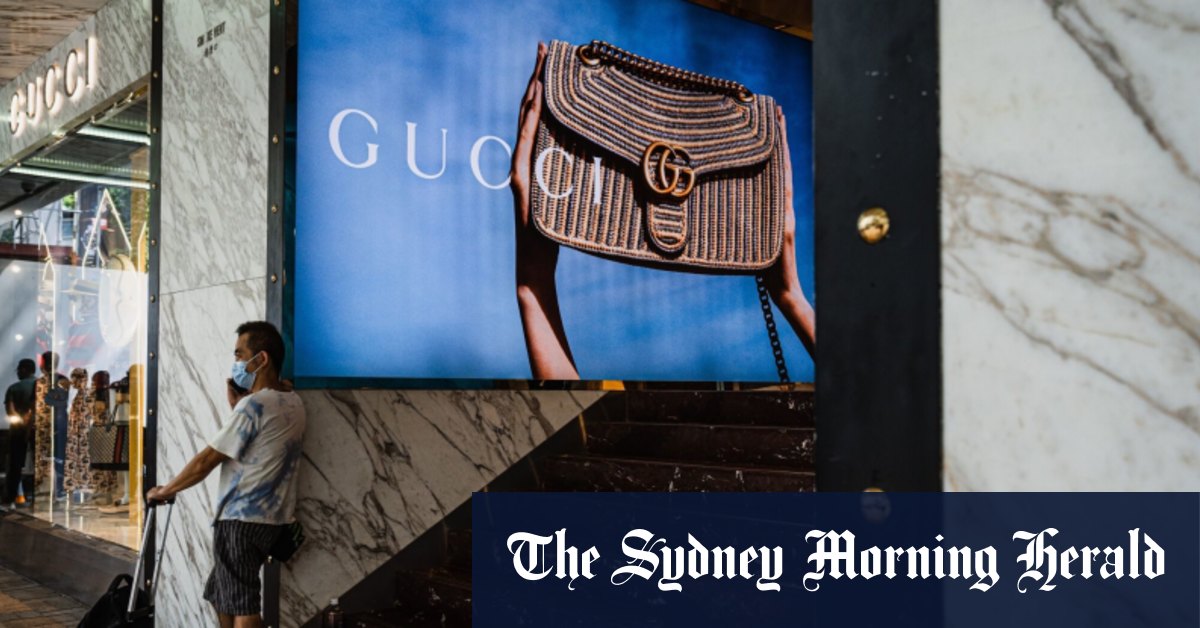By Eric Pfanner and Angelina Rascouet
Kering shares plunged after the French luxury group warned that sales at its Gucci brand have fallen about 20 per cent in the first quarter as its brash look loses favour with Chinese shoppers.
The stock dropped 12 per cent in Paris trading, its steepest decline since March 2020, wiping about €6.3 billion euros ($10.5 billion) from Kering’s market value.

Gucci has long been one of the most volatile of the major luxury brands.Credit: Bloomberg
Kering blamed a steeper-than-expected sales drop at Gucci in the Asia-Pacific region. The fashion group has been trying to revitalise the Italian label that accounts for about two-thirds of its profit, so far without success. The warning will likely prompt renewed speculation over how Kering might lessen its reliance on a brand known for flamboyant designs that are out of step with the current trend toward understatement.
Controlled by the billionaire Pinault family, Kering has struggled to keep up with rivals like LVMH Moet Hennessy Louis Vuitton and Hermes International as luxury sales have cooled over the past year, especially in China. LVMH’s broader brand portfolio and Hermes’s long waiting lists for handbags have made those companies more resilient.
“Gucci has been encountering some company-specific problems for a few quarters, but this update will raise further worries about the state of consumer spending and China’s economy,” analysts at Vital Knowledge wrote in a note to clients.
Kering’s pain comes amid a cooling market for high-end goods and in particular weak demand in China. The Asia-Pacific region, excluding Japan, made up 35 per cent of group revenue last year, more than Western Europe and North America. That’s slightly more than the 31 per cent at LVMH.
But Chinese consumers — once major buyers of global luxury goods — have been tightening their purse strings as a real estate crisis and job insecurity hurt confidence.
Overall, comparable sales at Kering, which also owns labels like Yves Saint Laurent and Balenciaga, will be down about 10 per cent for the period, the company said.
New designer doubt
Gucci sales fell in the final months of last year as the label struggled to lure more wealthy shoppers to its pricey Double G belts and Princetown slippers. Kering chief executive officer Francois-Henri Pinault warned last month that heavy investments in its labels will put pressure on the group’s profitability this year.
Sabato De Sarno was named as the brand’s new designer last year and he unveiled his first collection in September in Milan, which showed a more elegant and minimalistic aesthetic compared with the colourful looks of his predecessor, Alessandro Michele. Pieces from that collection only started to arrive in some stores last month.

Kering’s pain comes amid a cooling market for high-end goods and in particular weak demand in China.Credit: Bloomberg
Gucci has long been one of the most volatile of the major luxury brands, its fortunes rising and falling based on buzz around designers like Michele and a predecessor, Tom Ford. That makes Kering overall more vulnerable to shifts in taste.
“The jury is out on whether the Chinese will like the Sabato De Sarno quiet luxury,” analyst Luca Solca and colleagues at Bernstein said, referring to the current trend for more understated looks.
Early ready-to-wear products from the latest Ancora collection by De Sarno are meeting with a “highly favourable reception,” according to Kering. Their availability will increase in coming months, the company said.
Kering’s unexpected announcement is a “rather worrying signal for the luxury goods sector,” wrote Thomas Chauvet, an analyst at Citigroup. Its biggest label is suffering from “being in the midst of a major design and management transition, with weak performance of carryover items and limited penetration from early products” of the new collection, he added.
Kering started taking action to boost its struggling label two years ago when it began a management shuffle at Gucci by naming a new fashion head in China and Hong Kong. The group then parted ways with Michele and replaced him with De Sarno, a lesser-known designer from Valentino. Then Kering replaced Marco Bizzarri, who’d headed Gucci for about eight years, with Jean-Francois Palus, a longtime lieutenant of Pinault.
While investors believe in the long-term earnings power of Kering’s portfolio, “they need to see proof points on Gucci’s ability to regain some market share lost to its key rivals in 2020-23 or at least see some green shoots,” Stifel analyst Rogerio Fujimori wrote.
In the meantime, Kering has been active on the acquisition front, buying fragrance maker Creed as well as a 30 per cent stake in Valentino. Yet none of these deals is transformational, leaving the company heavily dependent on Gucci for now.
Bloomberg
The Market Recap newsletter is a wrap of the day’s trading. Get it each weekday afternoon.
